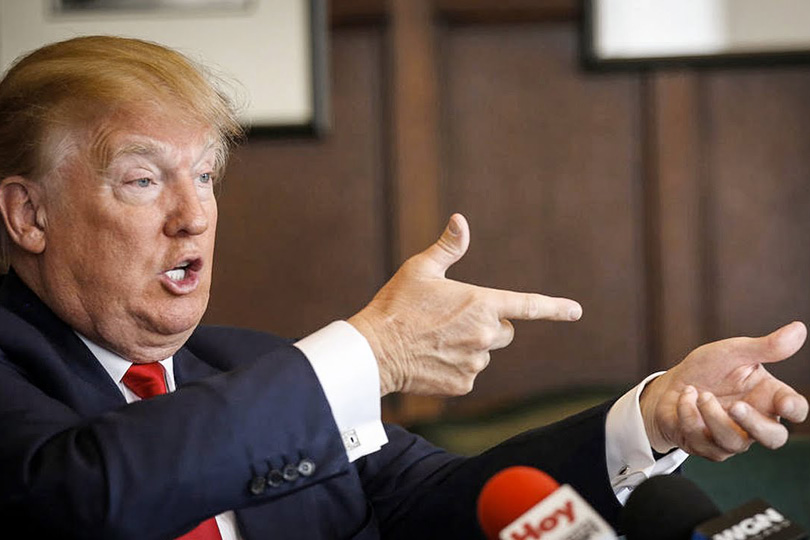STEPHEN M. WALT
After 100 days in office, what is President Donald Trump’s biggest foreign-policy mistake? I’m sure each of you will have your particular favorites. Personally, I’ve found there have been so many blunders it’s been a bit hard to keep track. Let’s consider the options.
Was his biggest error appointing an oddball like Michael Flynn to serve as White House national security advisor? Flynn lasted 20 days, which sounds more like a stint in rehab than a period of government service, and was ultimately done in by his dubious activities, his inability to tell a straight story about them, and a flood of leaks suggesting he had no idea how to do his job. His replacement, retired Army Gen. H.R. McMaster, has been cleaning house and made some mainstream appointments, but unqualified hacks like Sebastian Gorka still have jobs while dozens of other key positions at State, Defense, and other agencies remain unfilled.
Or did Trump err by failing to monitor, control, or straighten out his associates’ tangled connections to Russia, a failure compounded when people like Flynn and Attorney General Jeff Sessions proved unable to tell a straight story about them? We still don’t know what Trump’s connections in Russia really are, and it’s entirely possible that there’s no fire behind all the smoke. But the upshot of the whole debacle is that Trump couldn’t pursue a reset with Russia now if it wanted to. The whole mess is deeply unfortunate from a geopolitical perspective, because the United States could still use Moscow’s cooperation on a number of issues and there are some serious disagreements between the two states that need to be worked out in a disciplined and hard-headed fashion. Trump’s carelessness in this regard has constrained his diplomatic latitude significantly.
Perhaps you’d nominate Trump’s too-eager embrace of the authoritarian governments in Turkey, Egypt, and Saudi Arabia, and his indifference regarding Israel’s continued drift toward apartheid. None of these countries genuinely reflect the values Americans claim to revere, and their governments are all headed in worrisome if not downright dangerous directions. Trump got a brief boost when he ordered cruise-missile strikes following the Syrian government’s use of chemical weapons, but a single salvo is not a policy and the attack did not alter the situation in that unhappy country in any significant way. It was “a tale told by an idiot, full of sound and fury, signifying nothing.”
Nor can the administration make up its mind about the nuclear deal with Iran. Top officials grudgingly admit that Iran is living up to the terms of the deal while falsely identifying Iran and Hezbollah as the “chief culprits” of the Middle East crisis. Iran is involved in Syria and Yemen (though the extent of its influence is often exaggerated), but Washington has done at least as much to cause the present crisis as Iran has. Continuing to demonize Iran is playing with fire, because if Tehran concludes the United States isn’t living up to either the letter or spirit of the Joint and Comprehensive Plan of Action (the nuclear deal) it may decide to restart its nuclear program and give Trump the unenviable choice of a nuclear-armed Iran or another Middle East war.
And then there is Trump’s inept handling of some of America’s most important allies. He conducted confrontational phone calls with the president of Mexico and the prime Minister of Australia, presided over an embarrassingly awkward meeting with Chancellor Angela Merkel of Germany, and keeps tweeting not-so-subtle expressions of support for presidential candidate Marine Le Pen in France. Although the Blob is starting to rein Trump in, his erratic personal conduct remains a serious liability.
These are all worthy candidates for Worst Mistake So Far, but in the long run Trump’s biggest mistake has been his clueless approach to Asia. Europe is important, but its current problems are mostly internal and the United States cannot do much to address them. The Middle East is a mess, of course, but the United States does not need to fix it, does not know how to fix it, and shouldn’t waste time, money, or soldiers’ lives trying to fix it. Trump may find himself dragged back into the Middle East cauldron — especially if he tries to get tough with Iran — but his missteps there have done little damage so far (fingers crossed).
Asia, by contrast, is where the action is. It is a region where economic importance has been growing steadily, a trend that is almost certain to continue. Equally important, China is the only possible long-term peer competitor for the United States and the only other potential “regional hegemon” in the world. If China keeps rising and eventually drives the United States out of Asia, it would be free to project power all over the world, just as the United States does today. With a population that is much greater than ours and an expanding economy as large or larger, a powerful and unconstrained China could even forge alliances with allies in the Western hemisphere, thereby ending the surplus security that the United States has enjoyed for more than a century.
Preventing China from dominating Asia is the main reason the United States seeks to remain an active presence there. To do this, however, the United States needs active and enthusiastic support from its various Asian allies. This realization drove the so-called pivot or rebalance to Asia, an Obama-era initiative that was actively welcomed by America’s Asian partners. Rebalancing was a multifaceted effort that included redeploying some U.S. military assets, offering verbal assurances to key Asian partners, and demonstrating U.S. resolve in contested areas like the South China Sea. It also involved the long effort to negotiate the Trans-Pacific Partnership (TPP), a multilateral trade deal that would have benefited the U.S. economy and reinforced political ties with a number of key Asian partners.
But as I have argued before, managing this complicated set of alliance relations was never going to be easy, even though many Asian and Southeast Asian states are worried about Chinese power and its growing ambitions and are therefore eager for U.S. backing. It is a hard coalition to manage because the distances within it are so great, which makes different Asian powers less likely to come to one another’s aid. U.S. allies in Asia also have significant economic ties to China, which creates obvious tradeoffs for them and gives Beijing some leverage. When South Korea agreed to U.S. deployment of the THAAD anti-missile system, for example, China responded by putting restrictions on some South Korean companies operating in China and threatening other economic measures. And some U.S. allies — most notably Japan and South Korea — don’t get along so well, further complicating the alliance-management problem.
For this reason, the United States needs smart, sophisticated, knowledgeable, and, above all, disciplined people working to solidify and nurture our Asian alliance ties. What has Trump done instead? He started off by tearing up the TPP, an enormous blunder that will have lasting consequences. He questioned the “One China” policy and took a phone call from Taiwanese President Tsai Ing-Wen, and then had to back down and reassure Beijing that this didn’t mean anything.
Then Trump held that acrimonious “get-acquainted” phone call with Prime Minister Malcolm Turnbull of Australia, the leader of a country that has fought alongside our soldiers in every major conflict since World War II. Trump’s meeting with Xi Jinping was blissfully inconsequential, though Xi had to explain why the situation with North Korea was more complicated than the U.S. president had realized and that Beijing couldn’t just snap its fingers and get Kim Jong Un to fork over his nuclear arsenal. Trump stumbled again by telling reporters that South Korea had “once been part of China,” a blunder that quickly drew a heated response from Seoul.
Since then, Trump has raised the temperature with North Korea, hinted at preventive war, and inaccurately claimed to be sending an “armada” to patrol the waters off the Korean Peninsula. Turns out the flotilla in question, led by the aircraft carrier USS Carl Vinson, was actually headed in the other direction, but press secretary Sean Spicer gamely declared it got to the waters near North Korea Shades of Emily Litella. To complete the comedy, Vice President Mike Pence visited the Korean Demilitarized Zone, stared grimly out at the border, and said “it was important for North Koreans to see our resolve in my face.” That approach might work if Pence were a superhero who could shoot laser death rays with a single glance, but as a genuine signal of commitment it was widely and justly mocked.
There are two big problems here. First, Trump’s handling of Asian affairs from day one has been ignorant and incompetent. It takes a certain talent to misplace an aircraft carrier battle group (or to not know which way it’s headed), but these stumblebums managed to do it. These (and other) errors have undoubtedly raised doubts in the minds of our allies, no matter how many stern looks the vice president makes or how much we try to reassure them. They may not doubt our level of commitment to them, but they have good reason to doubt the judgment of the people now in charge.
Second, managing U.S. alliances in Asia is a challenge because these states fear both abandonment and entrapment. Nobody in Asia wants a serious confrontation, let alone a war, and Asian powers tend to react negatively toward whomever they believe is “raising the temperature” in the region. China’s sharp-elbowed approach in the South China Sea pushed these states toward us, but an overly bellicose U.S. response to North Korea could encourage our Asian partners to begin to distance themselves. It takes knowledge, discipline, and sensitivity to walk that fine line between doing too much and doing too little, and Trump’s team has displayed none of the above since he took office.
There’s one piece of potentially good news. Pence has just announced that Trump will attend not one but three Asian summits in November. Assuming he’s not going just to help Ivanka sell some shoes, these trips will give him the opportunity to display an appreciation for Asia’s importance and at least some understanding of the complex issues involved there. The danger, of course, is that he still won’t have a solid team that can write his speeches, provide the talking points, orchestrate his meetings, head off big Trumpian blunders, and keep him away from his Twitter feed. Next November, we’ll get a pretty good look at the president’s learning curve. But if I were National Security Advisor H.R. McMaster, I’d start tutoring him now. And, like the president himself, I’d use small words.







Comments